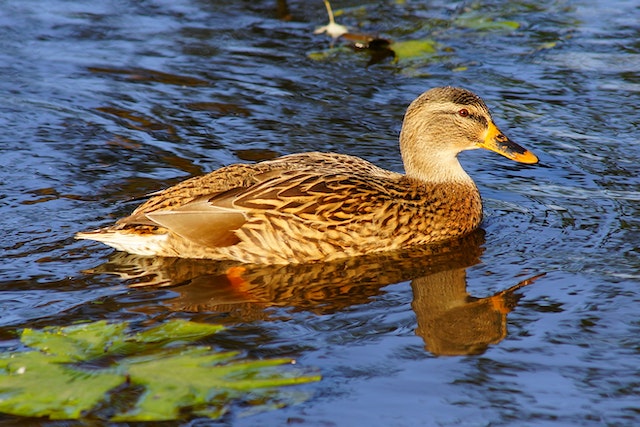
Too busy to read? Watch on YouTube
Why do ducks float? They float because of their center of gravity, their hollow bones, the air in their feathers and air sacs, and the oil on their feathers.
Whether or not something floats has to do with the object’s density and the buoyancy of water. Water has a density of 1 kg per liter. If something has a greater density than water it will sink and if something has a lower density than water, it will float. Ships can float because of this principle. When you put something in water, it displaces water to make room. The water that is displaced pushes back on the object displacing it with a force equal to the weight of water that has been displaced. 1 cubic meter of water weighs 1000 kg. That means if you put a cubic meter of something in water that weighs more than 1 ton, it will sink because the water is pushing back with a force of 1 ton. A cubic meter of lead weighs 11,342 kg, so it will sink in water. A cubic meter of pinewood weighs 450 kg, so it will float. However, that cubic meter of lead will float if you change its density. If you beat it into a thin boat shape, it will float because the volume of the lead has increased thanks to the huge air space inside it, but the mass hasn’t, which means it now displaces more water than its own weight. This can be seen with ships. The largest ship in the world is the Prelude, which weighs 300,000 tons. It has a volume of 600,000 cubic meters, so it displaces 600,000 tons of water. More than enough for it to float.
This is the reason why some people can float and some can’t. The average density of the human body is 985 kg per cubic meter, which is slightly lower than water. However, some people will be higher than that and some lower. The slight difference means we can just about float in water, which makes it good if we want to swim. If we breathe in and increase the amount of air inside us, we increase our volume without increasing our mass and we float more easily. If we breathe out, we decrease our volume without decreasing our mass and we sink. This is why dead bodies often float to the surface when they start to decompose and fill with gas. It is also why we can float so easily in the Dead Sea. All of the salt in the Dead Sea increases the density of the water, which means more dense objects can float in it.
So, why do ducks float? The first reason is their density. Birds have hollow bones because they need to keep their mass down in order to be able to fly. This makes them very light. If you divide their mass by their volume, you get a density of 0.9 g per cubic centimeter. Water has a density of 1 g per cubic centimeter, so ducks are already less dense than water. They have two more tricks that make them even less dense. Different species differ, but they have roughly nine air sacs in their bodies that hold air. These increase their volume without increasing their mass and make them even more buoyant. The second trick is to trap air in their feathers. This again makes them even less dense and more able to float.
Another reason ducks can float is the oil they produce. It is easier for us to swim in a swimming costume than it is in clothes because our clothes would become saturated with water, increasing our density, and making us sink. This is the same for ducks. If their feathers became saturated with water, they would sink. To prevent this, they produce an oil from a gland called the uropygial gland. It is found at the base of their tail, and they can spread this oil all over their feathers. Oil is hydrophobic, which means it repels water and keeps the duck’s feathers waterproof.
The last thing that helps the ducks float is their center of gravity. Their legs are at the center of their body and the weight of their tails, and their heads is well balanced. The air sacs in their bodies also help to keep them centered and upright. If they happen to flip over, they can use their strong wings and legs to right themselves again.
So, ducks float and we don’t because they are much less dense than water. And this is what I learned today.
Photo by Pixabay: https://www.pexels.com/photo/animal-bird-duck-feathers-235915/
Sources
https://animals.howstuffworks.com/birds/duck-float1.htm
https://animals.mom.com/duck-float-9392.html
https://animals.mom.com/duck-float-9392.html
https://www.explainthatstuff.com/how-ships-work.html
https://harrisonmathclassroom.weebly.com/uploads/1/5/5/2/15525464/pg._256-257.pdf
https://onlinelibrary.wiley.com/doi/abs/10.1111/j.1474-919X.1995.tb08046.x
